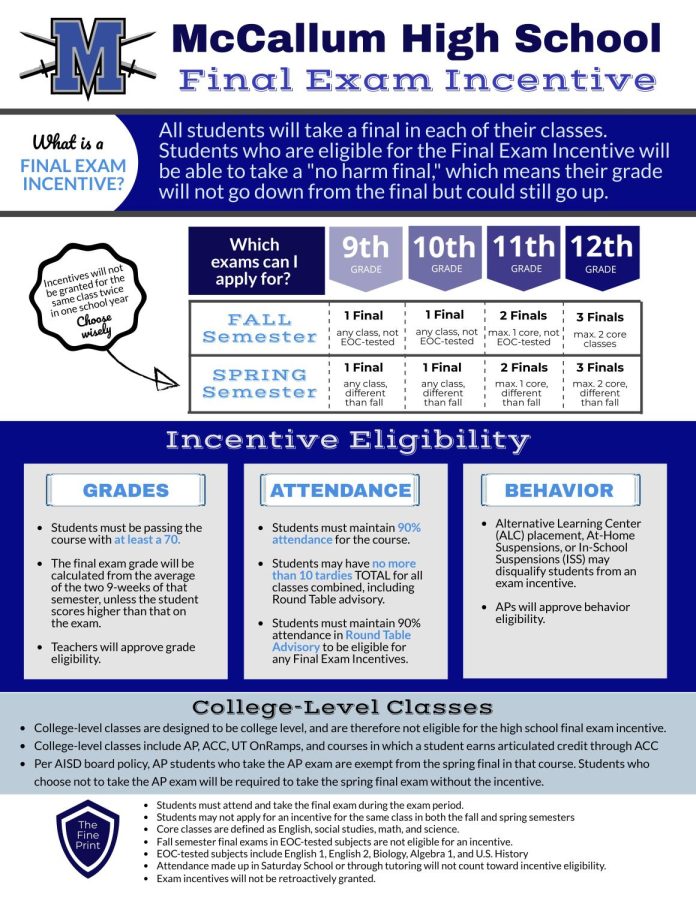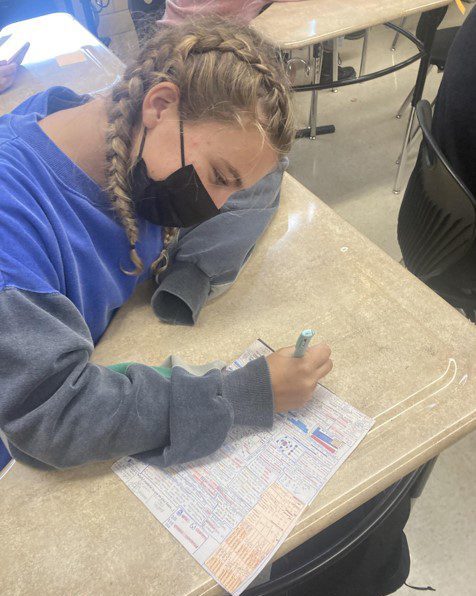On the morning of Aug. 30, students opened their Blend pages to find an unexpected announcement introducing the new final exam incentive policy.
Since the fall semester of the 2020-2021 school year, McCallum has had a plan in place to help students reduce stress around final exams. At the time there were a lot of uncertainties about when graduation would occur, and administrators wanted to make the school year and the final exam process as seamless as possible for students.
“We were doing all kinds of things to help students who were going through a really challenging time,” principal Nicole Griffith said. “We were also in a time when testing, frankly, was just really hard as most of our students were at home.”
Griffith and a group of counselors, teachers, department heads and administrators, worked together as the Mac Leadership Team to create solutions to the challenges students faced while attending school online. Its goal was to make final exams happen in a way that would be easy and less stressful for both students and teachers.
“It was done in a year that was very different for us,” Griffith said. “We designed the final exam waiver during a very strange time, and we did it knowing that we would probably need to change it.”
After coronavirus subsided and the online school era ended, McCallum moved back to a more conventional teaching structure, and the committee decided to try the exam waivers in this standard setting.
“We went into the next year, and we also had a lot of uncertainty about what the year would look like,” Griffith said. “But as we went through last year, we realized that we did need to make some adjustments, and one of the reasons that we needed that is the school policy says all students have to take a final exam.”
But as we enter this new school year, the final exam policy is changing again. Over the summer, the Mac Leadership Team came together to create a revised plan that would still give students a boost from the stressors of finals.
“The incentive is a way for students to be able to approach their finals hopefully with a little bit less stress,” Griffith said. “They can choose one final that might be a little harder or a class that they’re happy with their grades in or they don’t want to take that final, and they don’t have to stress over it because it’s a no-harm final.” she continued. “Learning can be uncomfortable. Learning can be challenging. So the goal is that this works for that. We know that this helps students who are doing well.”
One of the changes implemented into the new final exam policy is that students of each grade level receive a certain amount of “no harm finals” each semester. Simply put, they can’t be exempt from the test completely, but the exam results won’t negatively affect their existing grade.
“Let’s say I’m taking a final in English that I have the incentive on, and I have a 92 going in,” Griffith said. “I know that no matter what I do, the lowest grade I’m going to get is a 92 because I’ve already shown mastery in that way. But I’m still going to take it and hopefully I’ll get a 96 and my grades will go up.”
Griffith said the decision to switch from exemptions to incentives was influenced by teacher preference.
“We had to make it something doable for teachers,” Griffith said. “One of the stresses that they had with the final exam waiver is they had students in the room who were doing two different things. And that wasn’t working.”
As long as students meet the eligibility requirements (which match last year’s), with the small added caveat that round table advisory will count toward attendance, they must have a 90% attendance rate in a class, then they can qualify for the incentive.
“The teachers really wanted to include roundtable as a part of it,” Griffith said. “We want to reward students who are doing what they’re supposed to be doing and that is part of what they’re supposed to be doing.”
The biggest shift in the policy this year is the amount of no-harm finals each grade level is allowed to take. The number significantly dropped from last year. With the new policy, freshmen and sophomores are granted only one no-harm final, juniors get two and seniors up to three, none of which can be repeated in a given class in the spring semester if used in the fall semester. This is what came as a surprise to a lot of the McCallum student body.
“If sophomores, juniors, and seniors are getting a final bumped from exemptions, the freshmen shouldn’t be able to waive any, ” sophomore Audrey Powers said. “I feel like it’s a rite of passage to get to waive one extra final every year. Everyone who went to McCallum last year and is back this year just got this massive letdown.”
As students realize that they are having to take more finals than they thought, a mixed bag of feelings arises.
“It’s disappointing that you lose the amount of finals you can waive,” junior Gabi Alfarache said. “Even as a junior, because this is the same amount that I could waive last year, and you can’t even fully waive them.”
The new policy has a major effect on seniors. Previously, in the fall semester, seniors could waive four finals equaling to half of their workload. In the spring, they could waive all of them. Now they can apply for a no-harm final in two core classes in the fall and two different core classes in the spring.
“It just kind of feels like we’ve been cheated out of what the seniors in the past years have gotten, you know?” senior Arwen Fredrickson said.
Seniors already have the extra pressure of applying for and getting ready for college, so this added layer was upsetting for some.
“I am very disappointed because, by the end of the year, I’m not going to want to take any finals,” senior Eric Thatcher said. “I’ll already know what school I’m going to, and that adds on to the pressure because we also already have AP exams.”
Shaving off the amount of no-harm finals that students can apply for came with a lot of consideration from the Mac Leadership Team.
”Our goal in high school is to prepare students for the next step in life,” assistant principal Andy Baxa, one of the members of the Mac Leadership Team said. “Our old policy did not adequately prepare our students for the rigors of college.”
Preparing students for the rigors that come with college, including the study habits of preparing for tests is a reality that was factored into the new policy. According to Baxa, the waiver policy simply didn’t prepare students well enough for what they would face in their future education.
“With our focus being preparing students for the next step in life, the new policy is more in line with our goals as a campus,” Baxa said.
It was a whole team effort to decide what the right decision was to benefit the students and their teachers.
“That was a really robust conversation with the Mac leadership, are we doing what we need to do?” Griffith said. “Where’s the balance and making sure that we’re preparing kids for that next step and not harming them because really, if we don’t challenge our students, we are not doing them any favors.” Griffith continued. “We really do need to prepare students for college. And so this is I think the right balance.”
But it wasn’t an easy decision to make. The team considered the reasons why seniors didn’t have to take their finals the last 2 years, and that was no longer a problem. With the uncertainties of coronavirus also came the uncertainty of graduation which was the major reason why seniors were allowed to be exempt from the end-of-year finals. Since in both the 2020-2021 and the 2021-2022 school years graduation was at an unknown date, they could give seniors the go-ahead to waive the end-of-year finals.
“When we first designed it in the spring, seniors could opt out of all of their Finals,” Griffith said. “And part of the reason for that is that in 2021, so not just the graduating class but the one before when we first designed it, graduation occurred prior to finals. We had no way to even do finals with seniors.”
Knowing this year that graduation would occur after finals, they could make the adjustments to the policy.
“And that is why we’re going to have it to where the seniors can incentivize three finals,” Griffith said. “And seniors that are in AP classes who take the class AP test are exempt from those finals, which means they don’t have to take it at all.”
Anyone who takes a spring AP test is fully exempt from taking spring the final exam for that class, no matter what grade. Fall final exams in college credit or EOC-tested classes are ineligible for incentives.
“Now at the same time AP is in the spring, there’s a huge incentive to take the AP tests and not have to take the final,” Griffith said. “The reason AP has that exemption is because students are taking a big test and they went and took a big test that is there, that box is checked.”
While the policy might need yearly revisions or small changes, the school does want to keep the final incentives to help students and reward them for all their hard work. The Mac Leadership Team worked to create something that was both fair to teachers and students in this new year.
“My hope is that we will be able to stick with it,” Griffith said. “But you know, I will always say this and this is just because we need to be flexible. And if something’s not working, we need to change it. You have to see if it works or if it doesn’t meet the right needs for kids. Does it help them have an incentive and also help them prepare? I think we found the right balance.”
With all the work that was put into the new plan, Griffith, Baxa and the team of many other teachers, counselors and admin hope the Final Exam Incentive policy helps students while preparing them along the way.
“I hope it allows students who are doing well to have a little extra,” Griffith said. “That’s all I want. We want to reward students who are doing what they’re supposed to be doing. And that really is the goal. We want to reward them without hurting them because, at the end of the day, the next step is a challenging one outside of high school.”














